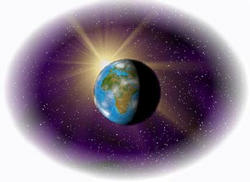| Wonder | 2003-04-05 23:10 6 comments |
 by Flemming Funch by Flemming FunchOne of my favorite Alan Watts books is "The Book (On the Taboo Against Knowing Who You Are)". Here's from the first chapter: "It is a special kind of enlightenment to have this feeling that the usual, the way things normally are, is odd--uncanny and highly improbable. G. K. Chesterton once said that it is one thing to be amazed at a gorgon or a griffin, creatures which do not exist; but it is quite another and much higher thing to be amazed at a rhinoceros or a giraffe, creatures which do exist and look as if they don't. This feeling of universal oddity includes a basic and intense wondering about the sense of things. Why, of all possible worlds, this colossal and apparently unnecessary multitude of galaxies in a mysteriously curved space-time continuum, these myriads of differing tube-species playing frantic games of one-upmanship, these numberless ways of "doing it" from the elegant architecture of the snow crystal or the diatom to the startling magnificence of the lyrebird or the peacock?Well, really Alan Watts is best to listen to, rather than read. There are many tapes of his talks, from the 60s. But in that book he presents a remarkably lucid explanation of what you are. Another way of putting it is that he takes apart the poorly founded illusion that you are a separate ego, isolated from and in conflict with the rest of the world. What is cool about it is that it is not in the form of mystical beliefs, but in the form of logical deduction, which you'd have a hard time arguing against. Thus it might be a way for compartmentalized western minds to come to terms with something bigger, without having to give up a belief in science and logic. There just really is no proof for the irrational belief that you're separate from the rest of the world. And if you accept the inevitable conclusion, everything is different. |